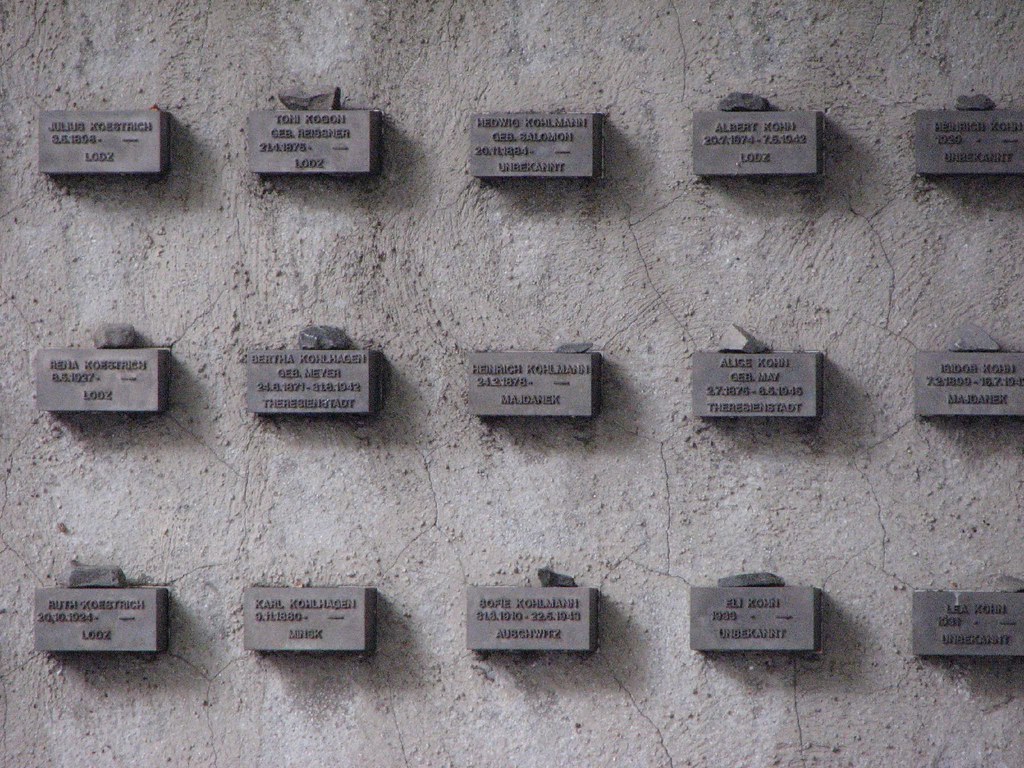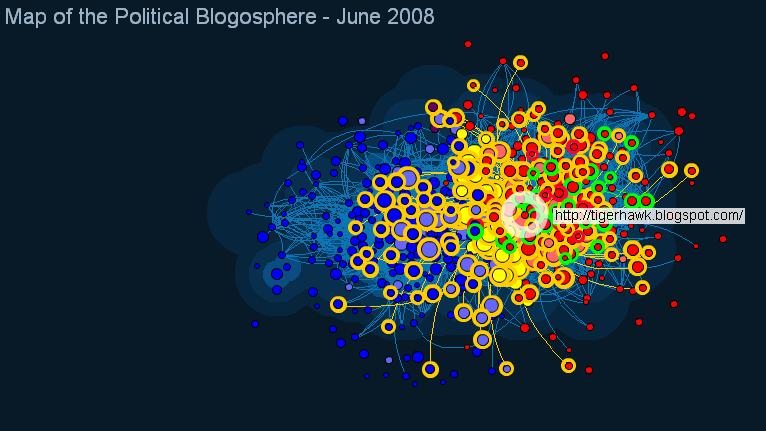Monday, June 30, 2008
Dumbing down Swiftboatary
Andrew Sullivan and others compare the left's attacks on John McCain's military record to "Swiftboating," which recalls the campaign of the Swift Boat Veterans for Truth against John Kerry in 2004. It is not, however, the best historical analogy that will catch on this year. Swiftboatary has been dumbed down:
...I must disagree with charges that McCain is being "Swift Boated." For this to be a "Swift Boating," people who stayed at the Hanoi Hilton would have to say that McCain was lying about what he did there -- or perhaps that his repeated claims that events there were "seared, seared" in his memory are false, and he was never actually there at all -- and those people would have to be telling the truth.
It would also get closer to Swiftboating if McCain compounded his public relations problem by refusing to release his military records because he did not want to reveal that he had lower grades in college than George W. Bush. Don't forget that.
(18) Comments
Harshest one-liner of the young week
Demotivators
This one, however, made me snarf coffee so I have to reproduce it. Hilariously disconcerting.

(6) Comments
Sunday, June 29, 2008
The NYT's story on al Qaeda in Pakistan
Drudge has been warning for several hours that Bush is angry about an imminent New York Times story about the frustrating hunt for Osama bin Laden and Al Qaeda Central in Pakistan. Well, the story has just gone up, and I am not sure what the sturm und drang would be about. Yes, it contains the usual unsubstantiated allegations about the various American agencies having been "distracted" by Iraq, but that is old hat. If there is news in the story, it is that the administration has been arguing internally for months about whether or not Bush should sign a covert order to send Special Operations forces into Pakistan -- the idea, essentially, is to invade Pakistan -- to catch or kill bin Laden. The tone of the article is that we really ought to have done so a long time ago, which is a departure from the Times' usual view that sovereignty is sacrosanct unless the United Nations says otherwise. Anything is possible, I suppose, if hammering George Bush is the result.
In any case, there are a couple of criticisms that might be noticed even by non-experts (and I am certainly one of those). First, there is the obvious point that Pakistan, an Islamic country armed with nuclear weapons that it might use or "lose," has essentially given al Qaeda de facto sanctuary within its borders. Touchy situation, that. It is possible to read the "infighting" described in the article as robust debate about the best way to handle that rather explosive turd in the punchbowl. Is this not the very internal contention that Bush critics claim he did not brook in the early years of his administration? Not only that, but the world is going to great lengths to tie down countries who pursue terrorists across national borders, at least if they are the United States or Israel. Indeed, one might argue that the Bush administration can at this point be forgiven for being careful about violations of sovereignty given the rather unprecedented legalism that much of the world applies to interstate actions with which we or the Israelis concern ourselves.
Second, one might also wonder what a corresponding article written from al Qaeda's point of view would look like. If the United States was "distracted" by Iraq, what about bin Laden? He declared it the central front in the war and vowed to drive the United States out, but he has not achieved that or been able to pull off a mass casualty attack outside the Arab Middle East since Madrid and London. Has al Qaeda also been "distracted" by Iraq? Almost certainly, even if the allegations in the Times article are also true.
The basic danger is that al Qaeda has, supposedly, reconstituted training camps in Pakistan. They are smaller than the operations given sanctuary by the Taliban before September 11, but still thought to produce terrorists capable of striking Western targets. Since Pakistan cannot apparently track and kill the terrorists on its own and is not willing to allow the United States to do it, al Qaeda will continue to enjoy protection under Pakistan's nuclear umbrella until some American president decides that a visible and prolonged offense to Pakistan's sovereignty is worth the benefit.
(8) Comments
Advice for presidential candidates
American politicians take note: By big majorities, we still believe that it is more important to make a bigger pie than to slice it more evenly. I'll go one further: We make a bigger pie because we do not try to slice it evenly.
(5) Comments
Barack's experience equivalency degree
Barack Obama hopes that American voters will give him credits toward graduation for experience by dint of foreign travel:
Barack Obama will arrive in Britain this summer on a long-expected seven-nation world tour including Europe, designed to answer doubts among global leaders — and US voters — about the direction of his foreign policy.
Hey, I bagged four countries in the last week alone! Sure, that's not enough to get a degree in experience suitable for the presidency, but I bet I could qualify for a cherry position on Obama's National Security Council.
MORE: Un-oh. I'd better be careful about posts like this, or Google might shut me down.
(5) Comments
Yet another constitutional right
Heh: "Court to mull individual right to drill for oil"
Why bother with time-consuming and costly litigation? Let's just get Justice Kennedy on the phone and ask his permission straight up.
CWCID: Glenn Reynolds.
(0) Comments
"Next we tried calling CNN to report possible cannibalism..."
Iowahawk was in Iowa City when it drowned, and found himself confounded by honesty and hard work at every turn:
As an Iowan and the proud owner of two big screen LCDs from Coralville Rent-A-Center, I've seen my share of weather disasters. But, even with full 1080p HD, I never really stopped to think that it could happen to me. So when the floodwaters of the Iowa River reached my own home this week, I suppose I was unprepared for the devastation -- and the aftershock that my fellow Iowans would sabotage my once-in-a-lifetime golden ticket on the FEMA gravy train.
I was enjoying midmorning cocktails on the patio of my estate a few blocks from the Iowa River when I first heard the flood warnings, and when I turned on the television I saw the shocking pictures of downtown Cedar Rapids inundated by the rising Cedar river. The implication was obvious: Ka-Ching!
As many of you know I am a victim of the subprime mortgage crisis, and have been battling eviction while our do-nothing Congress holds up my bailout money. With video like that -- and with a $2 million flood insurance policy -- your old pal Dave was 24 hours away from the mother of all disaster jackpots.
Read the whole thing, especially so you get to this part:
It was clear that somebody needed to take the bull by the horns and create some socko headlines to keep the media ball rolling. Kyle and I tried to get some of the little kids to start a riot inside the Refugee Center, but that fell apart when Dora the Explorer came on. Next we tried calling CNN to report possible cannibalism, but they just hung up.
I know, I know, I'm an asshat for linking to this, or even thinking that I should link to it.
(0) Comments
Is it possible to split Syria from Iran?
Conservative hawks -- ours and theirs -- have long dismissed the idea it will be possible to split Syria from Iran without a change in the regime in at least one of those countries. Stratfor wonders otherwise:
Unnamed French officials leaked in Asharq Al-Awsat daily newspaper on June 26 that Syria is prepared to “reconsider” its relations with Iran — a core demand that Israel has placed before Syria in their ongoing peace negotiations. The report stated that Damascus and Tehran do not see eye to eye on a number of regional issues, with the secular Syrian regime more interested in circumscribing Hezbollah’s power in Lebanon and preventing Iraq from becoming an Iranian-dominated religious state.
It has now been a full day since that report was leaked without a peep from Syria to deny the French claim, indicating that the peace talks taking place between Israel and Syria are actually getting somewhere.
The French, in particular, are more than ready to make sure these talks culminate in a Camp David-style agreement as France prepares to take the EU presidency July 1. With a mission to bring Paris back into the geopolitical limelight by integrating itself abroad in regions where French legacy already runs deep, French President Nicolas Sarkozy is eyeing the Levant for a major foreign policy success and has wasted no time in latching onto the Israeli-Syrian negotiating process. Arrangements are already being made for face-to-face meetings between Syrian President Bashar al Assad and Israeli Prime Minister Ehud Olmert when the two travel to Paris on July 13 for a Mediterranean Union summit.
The French are also busy reassuring the Syrians that Israeli domestic politics are not going to get in the way of the peace talks. While skeptics of the negotiations have focused on the point that Olmert is negotiating from a position of weakness given a bribery scandal that threatens to topple him from power, French diplomatic circles are pumping the Syrian state-controlled press with reports claiming that the main political players in Israel, including far-right Likud leader Benjamin Netanyahu, are also in favor of keeping the peace talks alive.
Syria appears to be feeling confident enough about the Israeli political situation to keep on trucking with the negotiations. Though Olmert is still in a precarious political position, the negotiations with Syria do not depend solely on him being in power. In fact, Labor leader Ehud Barak, as well as several high figures in Israeli political and military circles, sanctioned the negotiations when the channel between Israel and Syria opened in the fall of 2006. And with Barak’s recent decision to stave off party primaries and keep the ruling Kadima coalition intact, Syria can find comfort in knowing there is enough degree of continuity in the Israeli political spectrum to keep the talks going.
But while the diplomatic chatter continues, real progress in a Syrian-Israeli political deal will primarily be seen on the ground in Lebanon. An Israeli-Syrian rapprochement will have to involve Syria’s cooperating in trimming Hezbollah to size. As Stratfor has written before, a great deal of distrust has been brewing between Syria and Hezbollah ever since the February assassination of Hezbollah chief commander Imad Mughniyah in Damascus, and Syria has given a number of indications that there will be no love lost between itself and the Shiite militant group should Israel move on a deal.
When Syria feels it has received the proper assurances to move on the deal, it will likely employ its Islamist militant proxies in Lebanon to move against Hezbollah (not to mention Syria’s own security forces if and when the circumstances call for it). A number of Syrian and Saudi-backed Islamist militant groups — operating under a variety of shadowy names that are designed to sow confusion — have been popping up recently in Lebanon’s Palestinian refugee camps. Hezbollah, anticipating a Sunni militant campaign against the Shiite group, has been put on guard and is already digging its heels in for a bloody fight.
Commentary
Syria and Israel have a lot to trade each other. Syria wants the Golan back, guarantees against Israeli attacks on its assets, and free reign in Lebanon. Israel wants Syria to stop acting as a conduit for Iranian subversion and support for Hezbollah, guarantees that Syria will not attack Israel either directly or by proxy (the latter being much more probable than the former), and a counterbalance to Hezbollah in Lebanon. If Syria and Israel do reach a verifiable deal, therefore, a number of players will be out of the game: Iran, Hezbollah, and those Lebanese who aspire for their land to be free from foreign domination.
Peace, especially in the Middle East, means different things for different people, and it certainly can be a very bitter pill for those on the outside looking in.
(7) Comments
Drill here, drill now: Answering the "won't help now" response
The chief practical argument coming from those who oppose opening our continental shelf and the Arctic National Wildlife Refuge for drilling is that it will take ten years to get the oil so it will not have any impact on current oil prices. The response is that is factual and analytical hogwash, insofar as the whole point of futures markets is to discount the impact of changes in future supply.
It is also, by the way, reasoning that many on the left would not want applied to their own pet project:
My response to those who say that increased drilling is pointless because it won't yield immediate results -- like Arnold Schwarzenegger --is why worry about the greenhouse effect, then? Nothing we do will cool the planet immediately. Yet we're told immediate action there is vital. In fact, we're told that by none other than Arnold Schwarzenegger, in the very same speech.
One would have thought that this point was so obvious it would not have to be made at all. But then, one would also think it obvious that a "windfall profits tax" on oil companies would reduce the supply of oil in the future, since we have empirical evidence from the Carter fiasco that it will, yet Barack Obama continues to push the idea. That the mainstream media refuses to call Obama to account for the obvious impact of "don't drill, do tax!" on gasoline prices reveals them as utterly unthinking or completely in the tank for the guy. It is hard to know which it might be. Maybe it's both!
(32) Comments
Saturday, June 28, 2008
The greatest student prank of all time
Nearly as I can tell, the brilliant student prank is a dying art, a victim of way of too much seriousness and liability. This story, about the revelation of the secret behind the supposed greatest student prank of all time, reminds us what we have lost. Note particularly the incredibly cool response of the dean:
The then Dean of Caius, the late Rev Hugh Montefiore, had an inkling who was responsible and sent a congratulatory case of champagne to their staircase, while maintaining in public he knew nothing of the culprits.
When was the last time you heard of an academic administrator with anything like that sense of humor? And you know his charges benefited from it more than they ever would have had they been disciplined. There is wisdom there.
(5) Comments
A brief travel note
Finally made it on to the plane, more than seven hours behind schedule. Sitting next to two guys who -- and I quote -- "travel the world selling appetizers and fries to the military."
Talk about your niche businesses.
Good guys, though, and certainly right in the center of the TigerHawk reader demographic.
(0) Comments
Why I'll never be an academic foreign policy expert
Still in Frankfurt airport, seven hours later. I did manage, however, to find the only known public power outlet in the place, so I am sitting on the floor in Concourse E waiting for my plane, which is suppose to depart in two hours, which will be seven hours behind schedule.
If you are in Concourse E in Frankfurt airport, please drop by. I'm across from Gates E2-5 and extremely bored.
Anyway, this morning's International Herald Tribune contains an op-ed piece from Robert I. Rotberg about the vexing problem of Robert Mugabe, "Who will rid us of this tyrant?" Rotberg, who is "president of the World Peace Foundation and directs Harvard's Kennedy School program on Intrastate Conflict," decries Mugabe's reign of terror, runs through all the usual obstacles to doing anything -- including that the neighboring African countries are not interested in direct intervention -- and proposes rolling out the usual sanctions:
Second, since South Africa shows no appetite for an intervention and Zimbabwe's neighbors - Tanzania, Botswana, Mozambique and Zambia - are unlikely to act militarily without South African agreement, an Africa stained by Zimbabwe's tyranny should demand inviting outside Africans to patrol the country and oversee a free and fair real election; compulsory mediation by former UN secretary general Kofi Annan, who pacified Kenya earlier this year; denounce despotism in Zimbabwe; and a ban on all Zimbabwean aircraft from flying through neighboring airspace, thus effectively keeping Mugabe and his henchmen bottled up inside their decaying country.
So let me get this straight: South Africa, Tanzania, Botswana, Mozambique and Zambia "are unlikely to act militarily," but "Africa ... should demand inviting outside Africans to patrol the country and oversee a free and fair real election"? Huh? Rotberg establishes that Zimbabwe's neighbors are not actually going to do anything, and then proposes that something undefined -- "Africa," whatever that means in this context -- can expect Mugabe to accede to its "demand"? Maybe I'm just unfamiliar with the mystical power of the thing called "Africa," but I would be unable to write something that internally cocked up without blushing. Apparently an appointment to Harvard confers anti-embarrassment humility.
Then there is this confusing bit at the end:
Zimbabwe is in shambles. The United States and Britain would doubtless like to act unilaterally, but dare not. Only Africans and the UN have unquestioned moral authority.
The United States and Britain would "doubtless like to act unilaterally"? It is hard to tell whether Rotberg is ingenuously imputing a greater desire to invade Zimbabwe for humanitarian purposes than I believe could possibly exist in the White House or 10 Downing Street, or disingenuously snarking about Anglo-American unliateralism. Either way, both countries are pretty busy elsewhere. If they "dare not," it is because the the occupation of a central African hellhole is one of the few things less appealing than fighting jihadis in Afghanistan and Iraq.
Then there is the absurd idea that "only Africans and the UN have unquestioned moral authority". Since both "Africans" and the UN have a long track record of incompetence and brutality in peacekeeping missions in Africa, that their "moral authority" remains "unquestioned" reveals something extraordinary about Rotberg's morality (if he is wrong) and Africa's (if he is right), for one thing is absolutely certain: an Anglo-American intervention, were it to happen, would be vastly more humane than anything that might be cooked up by Zimbabwe's regional neighbors or the clowns on the East River.
So now you know why I am obviously completely incompetent to be an academic foreign policy expert.
(11) Comments
Seven hours
That is how long my flight out of Frankfurt back to Newark has been delayed. I am going to be really tired when I get home.
The battery may not hold out for more blogging from here -- work comes first, and Frankfurt airport does not seem to have exposed plugs whence to pilfer power -- so this might be the only post for the day. Accordingly, here are some perhaps interesting links to bide your time.
Andy McCarthy on the Boumediene world in which we live.
A high-powered discussion of the prospects for "delegating" the destruction of Iran's nuclear program to Israel.
A harsh and unforgiving look at the tax increases that Barack Obama has promised to impose on the people who pay most of the taxes in the first place.
Ed Lasky looks at Barack Obama's record on questions that tend to be of importance to American Jews. It is at odds with his rhetoric.
More later, if I can find me some juice.
(1) Comments
Friday, June 27, 2008
Pictures from Frankfurt
The old Frankfurt Opera House, earlier this afternoon:
Take a close look at the sculpture over the entrance. That's one intimidating woman. Only a German would put something like that on a building.
What is this wall all about?
Take a closer look at rectangular features...
The Frankfurt cityscape:
And, finally, the old and the new.
(2) Comments
Dissing the old South: The Democrats ban fried foods!
Fried foods being a threat to the world's climate, the Democrats have banned them from their national nominating convention.
This does not seem well coordinated with the Obama campaign's big plan to crack the solid South.
(2) Comments
Me and the huge German beer
Alone in Frankfurt with an evening to kill, I took a cab over to the square by the Romer and treated myself to schnitzel mit spatzle and a huge beer. I really love the huge beer in a German bar outside during the summer. Photo credit: a British motorcyclist named Paul.
(10) Comments
Attention Hawkeye fans
Serious fans of the Iowa Hawkeyes football team ought to check out the blog Meet Us At Kinnick. The, er, comprehensive game-by-game season preview post is a good place to start.
(2) Comments
Environmentalism hurts the environment, at least this time
The environmental movement, having lurched from one grave concern to another over the years (partly because it has, admittedly, substantially remediated many of the original ugly environmental problems), is now finding that its past victories are standing in the way of its new favorite remedies.
Faced with a surge in the number of proposed solar power plants, the federal government has placed a moratorium on new solar projects on public land until it studies their environmental impact, which is expected to take about two years. The Bureau of Land Management says an extensive environmental study is needed to determine how large solar plants might affect millions of acres it oversees in six Western states — Arizona, California, Colorado, Nevada, New Mexico and Utah. But the decision to freeze new solar proposals temporarily, reached late last month, has caused widespread concern in the alternative-energy industry, as fledgling solar companies must wait to see if they can realize their hopes of harnessing power from swaths of sun-baked public land, just as the demand for viable alternative energy is accelerating.
If the reduction of greenhouse gas really is the great moral struggle of our time and failure to do so will yield planetary catastrophe (as AGW activists often proclaim), then we are going to have to build massive amounts of entirely new non-carbon energy infrastructure. That will be virtually impossible to do on anything like the schedule demanded by the AGW believers without the repeal or amendment of the various 1970s-era legal obstacles that delay new development and thereby massively increase the cost of the required capital. In addition, we should consider establishing a special federal court to consider lawsuits against alternative energy development, and give it both fast-track procedural tools and preempting jurisdiction and authority.
Innovate the solar, modernize the grid, harness the wind, license the nukes, distill the grass, plug in the cars, and -- because the greens cannot win every battle -- drill here. Now.
(7) Comments
Obama said that?
Tom Maguire traces the evolution -- or, more properly, morphing -- of the public statements of various notable Democrats since the initiation of the surge in Iraq 18 months ago. It is only a start in what could be a giant compendium of wrongness.
CWCID: Glenn Reynolds.
(0) Comments
The view from my window: Beemer, Beemer, burning bright
I am in Frankfurt at the Hotel Hessischer Hof, and awoke this morning to a cacaphony of German sirens -- *ee-or*, *ee-or* -- outside my window. Turned out that it was not a terrorist attack, but a BMW burning ferociously on the park-like median strip of the road past the hotel:
[UPDATE: News coverage here and here, without my excellent photographs (which I hereby license to any news organization that provides a link back to this post)! Some guy burned his own car to protest high gasoline prices.]
There was no person evident who appeared to be the driver, which may mean that there was some poor soul still inside that hell. Or that the car burst into flame or was torched having already been abandoned. Either way, a sorry fate for a very nice car.
(9) Comments
The New York Times on Heller
The editors of the New York Times predictably editorialize against yesterday's Supreme Court decision (District of Columbia v. Heller) overturning D.C.'s ban of handguns on the grounds that the Second Amendment describes an individual right. The editorial not only misstates the decisional history in this area, but it is astonishingly unprincipled in its reasoning:
Thirty-thousand Americans are killed by guns every year — on the job, walking to school, at the shopping mall. The Supreme Court on Thursday all but ensured that even more Americans will die senselessly with its wrongheaded and dangerous ruling striking down key parts of the District of Columbia’s gun-control law.
In a radical break from 70 years of Supreme Court precedent, Justice Antonin Scalia, writing for the majority, declared that the Second Amendment guarantees individuals the right to bear arms for nonmilitary uses, even though the amendment clearly links the right to service in a “militia.” The ruling will give gun-rights advocates a powerful new legal tool to try to strike down gun-control laws across the nation.
This is a decision that will cost innocent lives, cause immeasurable pain and suffering and turn America into a more dangerous country. It will also diminish our standing in the world, sending yet another message that the United States values gun rights over human life.
Of course, all the same things might be said about Roe v. Wade, a decision that the New York Times defends passionately and obsessively, with the obvious difference that there was no actual Constitutional provision articulating anything approximating a right to abortion. Indeed, notwithstanding a rational textual basis for the Heller decision (as opposed to Roe), Heller was substantially less sweeping than the abortion decision, leaving plenty of room for the nuanced regulation of guns. Put differently, even if one were to concede that Heller overreaches in the recognition of an individual Constitutional right to bear arms (and I do not so concede), it does so far less intrusively than Roe v. Wade's construction of a right to abortion. If the editors of the Times were even remotely principled they would admit this much.
There are plenty of Constitutional rights that drive inefficient, inconvenient, or even unwise public policy. One can recognize that a right exists and deplore the consequences of the right. Law-and-order types do not like the exclusionary rule, yet it seems to be the only way to give effect to the Fourth Amendment. Consumer advocates might deplore pharmaceutical advertising, but hey, the First Amendment is always bothersome when it protects speech that we do not like. Well, so it is for people who want to ban handguns. The question is, what stops the editors from saying as much in this case: "We regret the impact of the Heller case and advocate the repeal of the Second Amendment, but Constitutional rights are rarely convenient or even popular in their actual application. Otherwise, they would not need to be rights." The answer, no doubt, is their intellectual dishonesty.
(11) Comments
Thursday, June 26, 2008
The left is different from us, or at least me
I am in Frankfurt, and by the time you read this I will have been -- Allah forfend -- long asleep. I expect to wake up in the morning and see many comments about this excerpt from the most recent editorial of Vanity Fair editor Graydon Carter. I found it profoundly alienating, and reflecting a view of the world, expressed and implied, that I cannot identify with even as I acknowledge that there are a great many people who feel this way. What is your reaction (and I used that word advisedly)? I'll check back in tomorrow morning.
If it can be said that the world was once out of step with America’s grand vision, it can also be said that we are increasingly out of step with much of the rest of the world—in ways both big and small. Only three nations don’t use the metric system. One is us; another is Myanmar. The U.S. is also the only major country that does not follow football (what we call soccer). Meanwhile, as Europe becomes less religious, we become more so—and in this respect we have more in common with our Middle Eastern foes than we do with our allies. Our leaders are more entrenched, more hidebound, more closed-minded—and just generally out of step environmentally and economically with the rest of the Western world. We are closing our borders and becoming more insular. (Except, of course, where oil is concerned—you certainly don’t hear the cry of “regime change” for Myanmar anywhere in the Bush White House.) The U.S. alone accounts for nearly half of the world’s military spending. Indeed, the Pentagon burns up more money in one month than the Russian military does in a year. Our official stance toward Cuba is as outdated as the mid-50s Chevys that cruise the streets of Havana. Now that the Cubans have access to cell phones and computers, change will accelerate faster there than it will in Washington. To the rest of the world we are not viewed as we see ourselves—as a beacon of democracy and justice. To many nations, the U.S., once the solution, has increasingly, under the Bush administration, become the problem.
Even though the cost of oil has increased by 400 percent since 2001, we have the cheapest gasoline in the industrialized world—and still Americans yelp about the price. The presidential candidates have offered little in the way of rational solutions to address our lethal dependence on foreign oil or to its rising price. The proposal put forward by Senators McCain and Clinton to lift the 18.4-cents-a-gallon federal gas tax during the summer months was a craven solution, comparable to giving a child candy to get his mind off his toothache.
The war in Iraq rarely makes the front pages or the evening news broadcasts during this presidential campaign year. In part, that is because covering this war has become so costly and so dangerous that the number of journalists there now represents a fraction of the number on the ground when this misbegotten adventure was launched. Just as the Pentagon sent its troops out ill-equipped, it is ill-equipped when it comes to bringing them home, alive or dead. It was bad enough that then secretary of defense Donald Rumsfeld couldn’t be bothered to sign letters of condolence to dead soldiers’ next of kin—the work was being done by an autopen. The Washington Post recently reported that some 200 servicemen and women, most of whom were killed in action, were cremated at a facility near Dover Air Force Base, in Delaware, that also handled the cremation of pets. It seems the Dover mortuary that is supposed to handle the remains of service personnel killed overseas doesn’t have its own crematory, and as with so many aspects of this war the task was outsourced.
(38) Comments
Bill Clinton's sunset years
If you have not done so already, you really ought to read Todd Purdum's tough article about Bill Clinton in the current issue of Vanity Fair.
Ouch.
(0) Comments
Speculators do not believe that speculators keep the price of oil high
Today, at least three interesting things happened in the oil market.
First, various "analysts" testified before Congress that the price of oil would fall by half if Congress some how "limited" speculation in energy futures.
Second, Democratic Representative John Dingell flapped his gums on behalf of regulating energy trading:
"Energy speculation has become a growth industry and it is time for the government to intervene," said Rep. John Dingell, D-Mich., chairman of the full committee. "We need to consider a full range of options to counter this rapacious speculation." It was Dingell's strongest statement yet on the role of speculators.
Third, oil soared to a new record price in excess of $140, causing me to lose a bet.
From this I conclude that oil speculators do not believe that the regulation of speculation, which is presumably ever more probable as a political matter (given the Congressional sturm und drang and that both presidential candidates have mumbled dark regulatory mumbles), will in fact reduce the price of oil.
(10) Comments
Oil: I lost
Regular readers know that around Thanksgiving I bet my brother Charlottesvillain -- stakes undetermined -- that oil would again see $60/bbl before it hit $140. I lost.
So you can help: What did he win?
(9) Comments
Wednesday, June 25, 2008
Oakville in pictures
Last week we linked to a post about Oakville, Iowa, the little town that died to save others. Now there are pictures, and they are grim.
Iowa has more towns and villages than any other state in the country. The Hawkeye state was settled in the years between the railroad and the automobile, so there were stations evenly-spaced within wagon distance of the farms and little towns grew up around those stations. Many of those towns have no real reason to be any more, they just are. When one dies in a disaster, as Oakville has done, what will bring the people back?
(3) Comments
Sandbox stuff
Seventy-seven Senators, including John McCain, sign a letter evincing support for Israel. Barack Obama writes his own letter that only he signs. Nobody knows why, but there are theories.
(6) Comments
Nancy Pelosi's attack on freedom of speech
Nancy Pelosi is again working to reinstate the "fairness doctrine," the long-repealed rule that required broadcasters to present all points of view.
There should be no doubt that this is nothing less than a broadside attack on freedom of speech. With the demise of spectrum scarcity as a reason to ensure balanced access to the airwaves, there is no longer any principled argument in favor of the fairness doctrine. Pelosi's advocacy of its reinstatement is a naked attempt to use the force of law to silence her critics and a grotesque affront to the First Amendment.
(13) Comments
Knighting Rushdie
Queen Elizabeth II on Wednesday knighted the controversial author Salman Rushdie, an award which caused protests by Muslims around the world when it was announced last year.
Rushdie was knighted for his services to literature.
This is to some degree old news -- the jihadis declared their rage when the list was produced a year ago -- but it is worth mentioning again if for no other reason than it pisses off all the right people.
(3) Comments
Obama and Iraq: Inching toward the new reality
The Financial Times tracks Barack Obama's carefully parsed language on the meaning of "withdrawal":
US presidents have a history of abandoning campaign promises by pointing out that “the world looks different from here” when they reach the Oval Office. A growing number of Democratic foreign policy wonks are hoping that Barack Obama will do just that with his Iraq election promises if he wins the race for the White House in November...
Senior advisers to Mr Obama say the campaign is constantly monitoring and debating its response to the situation on the ground in Iraq. But they say that Mr Obama has no plans to modify his timetable for US troop withdrawal. However, Mr Obama and some of his most senior foreign policy advisers have been dropping tantalising hints that there might be a new flexibility over their definition of “withdrawal”.
Mr Obama, who has constantly said he would be “as careful getting out of Iraq as we were careless getting in”, has already modified his commitment once. He began his campaign in early 2007 promising total withdrawal. Now he promises a withdrawal of all US combat forces, which leaves room for thousands – possibly tens of thousands – of US troops to stay behind.
Colin Kahl, a national security professor at Georgetown who is Mr Obama’s Iraq policy co-ordinator, wrote a paper in April suggesting the US should leave a “residual” force of 60,000 to 80,000 troops – far below the current 150,000 but much higher than the anti-war Democratic base would wish.
These would include counter-terrorism forces, military training personnel, force protection units and a regional “over-watch” group probably based in Kuwait that could return quickly if the possibility of genocide arose.
Mr Kahl was quick to point out that his paper was written independently of the Obama campaign. The campaign was also quick to distance itself from comments made by Samantha Power, Mr Obama’s former policy adviser, who told the BBC that the world – and Iraq – might well look different to a President Obama in January 2009.
Then last week Hoshyar Zebari, the Iraqi foreign minister, said that he had come away from a telephone conversation with Mr Obama feeling reassured that the Democratic candidate would “not take any drastic decisions, or reckless actions” with the US troop presence in Iraq. The Obama campaign disputed some aspects of the conversation.
Mr Obama frequently points out that he will consult US commanders on the ground and the Iraqi government about his withdrawal plans. “We have a great deal of flexibility about the modalities of the withdrawal but we are clear that it will take place under an Obama administration,” said a senior Obama adviser.
With Obama, there are always rubes to be fooled. I certainly hope that on matters of Iraq policy the rubes are on the anti-war left.
(4) Comments
Tuesday, June 24, 2008
Obama: Offshore drilling is a "gimmick"
According to Barack Obama, John McCain's proposal to permit drilling for oil and gas offshore is a "gimmick." Well, it is testable proposition, insofar as profit-maximizing companies either will, or will not, actually invest money in the endeavor if permitted to do so by Congress, and thereafter will or will not recover oil and gas. If Congress allows drilling and nobody elects to drill, then Barack Obama will have been right and no harm will have been done.
In any case, if ever we need proof that Obama is not the least bit concerned that anybody is actually listening to the words he speaks, it is this: Right after denouncing offshore drilling as a "gimmick" he declared the need to create "green jobs".
Seriously.
(10) Comments
Mystery photo!
Our vast influence
A site called PresidentialWatch08 has developed an interesting map of the political blogosphere, showing the relative influence of 297 leading blogs and other sites. Apparently "the idea here is to look at linking between political blogs in only a political context, discarding other links that are outside of context." Protein Wisdom has more.
Anyway, out of undoubtedly misplaced pride we note the location of this humble blog smack dab in the heart of the right side of the graph. Our influence is indeed vast, and we pledge to use our great power wisely.
(7) Comments
The "more dangerous than New York" defense
I am sitting in Dublin's airport waiting for my flight to London, leafing through the morning's Telegraph. There is this curious story:
Three judges at London's Criminal Appeal Court heard that Bruce Anthony Lee, 22, was intimidated by the "hostile" and "alien" environment while staying in the Longsight district and also chose to wear a bullet-proof vest.
He was in Manchester last December for the funeral of a cousin who had been killed in a gang battle.
Lee, who has no previous convictions, claimed he found the gun in a bush and fired it towards a police officer who was chasing him through the Ardwick housing estate....
"(Lee) was thrust into an alien environment and, though it pains me to say this as a Mancunian, New York is a very law-abiding city these days, whereas Manchester is rife with gun crime," the barrister said.
Now, the guy got five years for shooting at a cop, and the "more dangerous than New York" defense came up in a hearing to increase his sentence, judged too lenient by the prosecution. The judge having bought the defense's argument that, as a New Yorker he was terrified by Manchester's mean streets, Lee's sentence remained five years, which indeed does seem light.
Not wanting to take anything away from Lee's obviously skillful barrister, is it not likely that Lee was an indirect beneficiary of Rudy Giuliani's relentless self promotion? Put differently, would a British judge have been so receptive to Lee's argument if the mayor had disappeared into private life after 2002 and not so unstintingly claimed credit for the decline in New York's crime?
(5) Comments
Monday, June 23, 2008
The "best" hi-tech pranks
My children read this blog, so it is probably unwise of me to link to this list of the "best" hi-tech pranks.
Then again, there are far too few pranks in the world.
(2) Comments
False introspection watch: Barack Obama struggles with work-family balance
This latest claim of Barack Obama is nothing less but laugh-out-loud funny:
Later during a question-and-answer session with a group of about 30 women, Obama said he constantly questions the balance of work and family in his personal life.
"I'm away from my daughters all the time, and I'm away from my wife all the time," Obama said. "And so I'm always comparing, 'OK, is what I'm doing _ running for president or even being president _ worth the sacrifice of not being with my family?'"
Seriously? He does not know whether "being president" is worth the sacrifice of not being with his family? Either Barack Obama believes we voters are so stupid that we will fall for his faux introspection routine or he is arrestingly confused about his own character and motives. It is difficult to imagine what the third explanation would be.
CWCID: Rich Lowry.
(9) Comments
Is there anything that cannot be regulated and/or taxed?
Ecology doesn’t require homeowners to obtain water right permits to collect and store small amounts of rainwater. The new rule for the first time would define how much rainwater can be collected and used before a permit is required. The rule isn’t intended to regulate storage and release of rainwater when no “beneficial use” will be made of the water.I would think this would set a dangerous precedent with respect to sunshine collection as well.
Under state law, beneficial uses include recreation, irrigation, residential water supplies and power generation.
Washington law identifies rainwater as a water resource of the state.
(17) Comments
The Belmont Club has moved!
The Belmont Club and its proprietor have moved to Pajamas Media, where Richard will join the growing stable of huge, eloquent, and hugely eloquent minds who blog there. I have updated the blogroll link.
(0) Comments
When the levee breaks
Where floodwaters remained, they were a noxious brew of sewage, farm chemicals and fuel. Bob Lanz used a 22-foot aluminum flatboat to navigate through downtown Oakville, where the water reeked of pig feces and diesel fuel.
"You can hardly stand it," Lanz said as he surveyed what remained of his family's hog farm. "It's strong."
LeRoy Lippert, chairman of emergency management and homeland security in nearby Des Moines County, warned people to avoid the floodwaters: "If you drink this water and live, tell me about it. You have no idea. It is very, very wise to stay out of it. It's as dangerous as anything."
Over the course of days, access to drinkable water becomes a pretty serious issue for communities thus innundated.
Those with a preparedness bent can take a couple of steps to increase the liklihood that your family will be able to weather the storm (so to speak). Some modest water storage and filtering supplies can make a big difference in handling this type of crisis.
Those interested in water storage should plan on a gallon a day for every member of the family. The best way to store water is in containers manufactured for the purpose, and treated for long term storage.
 These can be procured through a reputable dealer such as Nitropak, which features a full line of water storage supplies (I am a satisfied customer and recommend this vendor, but have no commercial interest here) but clean empty plastic soda or milk jugs and a couple of drops of bleach will do for those on a tight budget. In my home I have a 55 gallon container, plus six 5-gallon containers (which can actually be moved if necessary), all filled and treated for 5-year storage. That sounds like a lot, but for my family of four is probably only five or six days worth, practicing pretty extreme conservation (ie no washing). Storage will only get you so far.
These can be procured through a reputable dealer such as Nitropak, which features a full line of water storage supplies (I am a satisfied customer and recommend this vendor, but have no commercial interest here) but clean empty plastic soda or milk jugs and a couple of drops of bleach will do for those on a tight budget. In my home I have a 55 gallon container, plus six 5-gallon containers (which can actually be moved if necessary), all filled and treated for 5-year storage. That sounds like a lot, but for my family of four is probably only five or six days worth, practicing pretty extreme conservation (ie no washing). Storage will only get you so far. In an extended water crisis, or in the event you have to evacuate your home, a high quality water filter would be essential to ensuring access to potable water.
 In a non-evacuation scenario, a high-capacity filter is best. A large table top filter such as the Big Berkey can filter most contaminants and organisms. I have one at my country house and rest easy knowing I can drink the pond water if the well goes out (the house sits on a hill so a flood is not in the cards).
In a non-evacuation scenario, a high-capacity filter is best. A large table top filter such as the Big Berkey can filter most contaminants and organisms. I have one at my country house and rest easy knowing I can drink the pond water if the well goes out (the house sits on a hill so a flood is not in the cards). 
I think a portable filter also makes sense and every family should have one. There is a growing number to choose from, but the Katadyn Pocket Filter is generally regarded as the best. It is also the most expensive. This is a popular filter among backpackers and relief workers around the world. I keep mine with the other stuff I am likely to grab in an evacuation scenario. I imagine there are a lot of folks in Iowa river country that would be happy to have one now.
As with anything gear related, everyone should do their own research to determine what best meets the needs and budget of their particular situation. These are the steps I have taken to ensure access to potable water in a crisis (and I don't live in a flood plain).
(4) Comments
Another government official proposes to criminalize speech
Another government official, tired of his ideas losing in the marketplace, proposes to criminalize the speech of his political opponents:
James Hansen [who heads Nasa's Goddard Institute for Space Studies], one of the world's leading climate scientists, will today call for the chief executives of large fossil fuel companies to be put on trial for high crimes against humanity and nature, accusing them of actively spreading doubt about global warming in the same way that tobacco companies blurred the links between smoking and cancer.
Hansen will use the symbolically charged 20th anniversary of his groundbreaking speech (pdf) to the US Congress - in which he was among the first to sound the alarm over the reality of global warming - to argue that radical steps need to be taken immediately if the "perfect storm" of irreversible climate change is not to become inevitable.
Speaking before Congress again, he will accuse the chief executive officers of companies such as ExxonMobil and Peabody Energy of being fully aware of the disinformation about climate change they are spreading.
In an interview with the Guardian he said: "When you are in that kind of position, as the CEO of one the primary players who have been putting out misinformation even via organisations that affect what gets into school textbooks, then I think that's a crime."
Officials of the United States government are supposed to uphold the Constitution. It is nothing less than outrageous that a government employee would propose to criminalize speech with which he disagrees. If Hansen's ideas, which enjoy the support of Al Gore, the United Nations, the Democratic Party, virtually every OECD government, and the vast majority of the media and academic establishment, cannot win in the marketplace, perhaps it is because they are not so persuasive as he maintains.
MORE: Anthony Watts, who knows a lot more about climate science than I do: "I suspect he’ll be calling for the jailing of bloggers like myself next. I think Mr. Hansen has lost all sense of reason, and his last shred of credibility."
(11) Comments
Cubs punish White Sox
Ryan Dempster continues his remarkable transition back to starting pitcher (last year he was the club's closer) and improved his record to 9-2. Aramis Ramirez hit his fourth home run of the three game series, driving in two. The Cubs improved to 48-28, the best record in baseball, and extended their lead to 4.5 games over the Cardinals (who lost an extra-inning thriller to the Red Sox at Fenway.)
Deep breath, stay composed. The season is long. The All-Star Break is only just approaching. The dog days of August can be brutal, especially with all those Wrigley Field day games. And these are, of course, the Cubs.
(1) Comments
The answer to the healthcare problem?
Letting Wal-Mart run the health care system would fix many of those problems. It's a company that understands how low prices can build market share and thus increase profits. Furthermore, it's a company with a culture of cutting costs that has shown no compunction in pushing suppliers to the wall over price. The Wal-Mart motto ought to be, "Make it cheaper, or we'll find someone who can." I'd love to see that attitude brought to bear in health care.
Of course it would drive Pelosi insane.
Read the whole thing.
(CWCID:Mish Shedlock)
(7) Comments
A great American is dead
His politics notwithstanding, George Carlin was a great American. I am much aggrieved by his death, many years before I, at least, was ready for him to go. Here is a list of Carlin's comedy albums. Were you to select a couple of them, I recommend you start with "Class Clown," the mostly clean album that turned him into a superstar, and "You Are All Diseased," the 1999 album with the eerily prescient segment mocking airport security.
I am sorry there will be no more Carlin to enjoy.
MORE: Ann Althouse has a wonderful round-up post, complete with video, which I will watch once I am done with my meetings for the day.
(2) Comments
Another dubious endorsement for the Obama campaign
For all the talk of the world's dictators endorsing Barack Obama, nobody is focusing on the more serious public relations problem coming from the world of designer fashion:
The latest "first" for Barack Obama comes off the Milan runway.
Calling the U.S. presidential hopeful "the man of the moment," Donatella Versace dedicated her Spring-Summer 2009 collection presented Saturday evening to Obama, creating a style she said was designed for "a relaxed man who doesn't need to flex muscles to show he has power."
The only thing scarier than a president dressed in these clothes is the prospect that a president might inspire countless others to dress in these clothes. But Versace did not stop there. No, she advised Obama to adopt the dinner jacket look made popular by Mahmoud Ahmadinejad:
Chatting with reporters in the cool of the garden of her private palazzo in downtown Milan at an after-show dinner party, the designer also had some fashion tips for the campaign trail. "I would get rid of the tie and jazz up the shirt," she said.
In fact, there were no ties in Donatella's latest show, and shirts under jackets were either super easy with rolled up sleeves or replaced by a silk T-shirt.
Great. Just what I want in my president. It is almost enough to make one yearn for beige cardigan sweaters.
Voters ignore the fashion issues in this election at their peril.
(5) Comments
Sunday, June 22, 2008
Bashing oil "speculators": A curious alignment of accusations
New Jersey Governor Jon Corzine, speaking as an Obama surrogate:
``Everyone believes there is too much speculation in the oil markets,'' New Jersey's Democratic Governor Jon Corzine, an Obama adviser, told reporters on today's call.
Saudi King Abdullah:
"Among other factors behind this unjust increase in oil prices is the abhorrent act of speculators acting for their own selfish interests."
(You have to admire the sheer hugeness of Abdullah's balls. He's a freaking king in charge of a police state that controls a cartel blaming speculators for "injustice". Bill Clinton does not sport that much brass.)
Iranian president Mahmoud Ahmadinejad:
"At a time when the growth of consumption is lower than the growth of production and the market is full of oil, prices are rising and this trend is completely fake and imposed," President Mahmoud Ahmadinejad said in a televised speech.
"It is very clear that visible and invisible hands are controlling prices in a fake way with political and economic aims," he said when opening a meeting of the OPEC Fund for International Development in the central city of Isfahan.
Democratic Senator Carl Levin:
"A major contributor [to high oil prices] is the rise in speculation. This is not a supply and demand issue."
Ordinarily, I would say that if King Abdullah, Mahmoud Ahmadinejad, Jon Corzine, Barack Obama, and Carl Levin all agree that evil speculators are responsible for high oil prices then they almost certainly are not. But now Paul Krugman comes along and alters the universe's natural order by saying that all these other guys -- you know, Obama, Corzine, Levin, Abdullah, and Ahmadinejad -- are wrong. I am, accordingly, dazed and confused.
(19) Comments
Historical perspective
From The Telegraph:
As he leaves the White House at the end of his second term, the President has a poll rating of only 23 per cent, and is widely disliked and even despised. His foreign policy has been judged a failure, especially in view of the long, painful, costly war that he declared, which is still not over.
He doesn't get on with his own party's presidential candidate, who is clearly distancing himself, and had lost many of his closest friends and staff to scandals and forced resignations. The New Republic, a hugely influential political magazine, writes that his historical reputation will be as bad as that of President Harding...
I am writing, of course, about Harry S Truman, generally regarded today as one of the greatest of all the 43 presidents, and the man who set the United States on the course that ended decades later in the defeat of Communism....
Judging by the rise in the value of the Iraqi dinar, the huge drop in the number of Iraqi deaths in the insurgency, the number of provinces now cleansed of al-Qa'eda, and the level of arms confiscations by the Iraqi Army in Sadr City, the new American "clear and hold" tactics have succeeded far better than the cynics ever thought possible even 12 months ago.
Give Iraq five, ten or twenty years, and Bush's decision to undertake the surge - courageously taken in the face of all bien pensant and "expert" opinion on both sides of the Atlantic - will rank alongside some of Harry Truman's great decisions of 1945-53.
The point, of course, is that history remembers only a couple of things about a presidency. Fair or not, the legacy of George W. Bush will turn almost entirely on whether international Islamist terrorism peaked, or not, on September 11, 2001.
(7) Comments
Blue planet
Via Michael Ledeen, some beautiful pictures from NASA. Good advertisement for the "Canadian space arm" in there, too.
(1) Comments
My whereabouts
So, I'm in a hotel room in suburban Dublin, Ireland, miles from anything of interest, cold wind and rain blowing outside, doing Illinois Continuing Legal Education classes online.
Just thought you would want to know.
MORE: In a graphic illustration of the extent to which my quality of life has declined, at least on a day-over-day basis, two years ago today we were on a bike ride through the mountains around Guilin, China:
A couple of scenic shots from that ride:
A monument to the revered ancestors:
(7) Comments
Saturday, June 21, 2008
Blackouts in the strangest places
Blackouts! Yet another example of the incompetence of the U.S. occupation and the Bush administration:
Iranians on Saturday were told to cut their electricity consumption by 10 percent or face daily power cuts because of a severe drought and low production at hydroelectric power plants.
Residents of the capital Tehran could face up to four hours of blackouts each day, officials said according to media reports.
"If consumers do not cut down consumption by 10 percent, we will have blackouts until the end of the summer," Deputy Energy Minister Mohammad Ahmadian told Fars news agency.
Oh. Wait. This story is about Iran.
Never mind, then.
(3) Comments
Andy McCarthy and Willful Blindness on Book TV
Andy McCarthy, leading proponent of the view that the criminal justice system is a poor method for combating Islamist terrorism and author of the must-read Willful Blindness: Memoir of the Jihad, discusses his book on CSPAN-2's Book TV this week. Schedule here. I am sure the show is much more worth your time than whatever you were going to watch anyway. Or, if you were going to claim that you do not watch television, click through the link above and read Andy's book without the interview!
(2) Comments
Oil at the margin
Andrew Sullivan links approvingly to a post that argues against drilling for oil in the Arctic National Wildlife Refuge because the marginal impact on the price of gasoline is likely to be only a few cents per share.
Supposing for a moment that is true, may I respectfully suggest that is a foolish basis for arguing against drilling in ANWR or on our territorial continental shelf. The first person to comment to the linked post observed, obviously, that "[t]he market and sources of oil are so vast any single field can be said to have 'no meaningful impact on price.' By this reasoning we shouldn't develop any new sources."
More importantly, though, the marginal impact on the price of oil is not the only story. There is also the marginal impact on our balance of payments. If ANWR were producing at its estimated capacity of one million barrels of oil per day, at today's prices that is a reduction in our trade deficit of more than $100 million per day, or almost $40 billion per year. At the margin, that is $40 billion out of the pockets of the (generally) disgusting countries that export oil, money that we do not have to repatriate in order to sustain the value of our currency (which we have to do if we want other people to keep accepting dollars in return for their stuff).
Now, none of this is to suggest that we can drill our way out of high oil prices or the importation of oil. America can and should reduce its consumption of oil by using it more efficiently and substituting other sources of energy. Even though oil prices may in fact head lower again, it is foolish for either individuals or our government to plan on the assumption that they will. Since we can expect the government to be foolish, individuals -- that means you -- ought to be changing their habits and reorganizing their lives on the assumption that high oil prices are here to stay.
But, and this is critical, the decision about whether to drill for oil and gas in supposedly sensitive areas ought to be weighed against alternatives. Is it really better for American drillers to invest their capital in foreign countries, most of which are adversarial to the interests of the United States? Is it really better for our best engineers and executives to devote themselves to Nigeria, Russia, and Saudi Arabia? If you are a transnational progressive (and most anti-growth environmentalists are), do you really want to push drilling, at the margin, into environmentally sensitive places in foreign countries with less regulation and more corruption? These are the choices we make when we close our own country to new exploration and production. While it may have made sense during the quiescent '90s when energy prices were low and we did not understand the many ways in which the dollars we trade for oil were being used against us, but how does it make sense now?
Drill here, drill now, even if we will not pay less.
(20) Comments
Carbon dioxide and temperature diverge
Recognizing all the variability, volatility, and gumflappery in the measurement of temperature, global temperature has now been unchanged, net, for eleven years, notwithstanding the continuing rise of atmospheric carbon dioxide. How long will this have to go on before it becomes an inconvenient truth?
Of course, AGW activists will say that current temperatures are still well above the "base" period, but there is obviously a great deal of reasonable doubt around both the selection of the base period and whether the measurement of temperatures then was being done in the same way as it is today. Even if we grant the valid selection and measurement of the base period, though, what does this hiatus say about the value of the models that predict the catastrophes that are supposed to come if we do not spend all our efforts in a war on CO2?
(5) Comments
The "idle lease" canard
One of the claims of people who oppose drilling for oil and gas offshore and in ANWAR is that extraction companies have already been given access to 68 million acres of federal land that they are not exploiting. True, but irrelevant:
Anyone with even the most basic understanding of how oil and natural gas are produced – and this should include many members of Congress – knows that claims of "idle" leases are a diversionary feint.
A company bids for and buys a lease because it believes there is a possibility that it may yield enough oil or natural gas to make the cost of the lease, and the costs of exploration and production, commercially viable. The U.S. government received $3.7 billion from company bids in a single lease sale in March 2008.
However, until the actual exploration is complete, a company does not know whether the lease will be productive. If, through exploration, it finds there is no oil or natural gas underneath a lease – or that there is not enough to justify the tremendous investment required to bring it to the surface – the company cuts its losses by moving on to more promising leases. Yet it continues to pay rent on the lease, atop a leasing bonus fee.
In addition, if the company does not develop the lease within a certain period of time, it must return it to the federal government, forfeiting all its costs. All during this active exploration and evaluation phase, however, the lease is listed as "nonproducing."
Obviously, companies want to start producing from active fields as soon as possible. However, there are a number of time-consuming steps to be taken before they can do so: Delineation wells must be drilled to size the field, government permits must be obtained, and complex production facilities must be engineered and installed. All this takes considerable time, and during that time, the lease is also listed as "nonproducing."
Because a lease is not producing, critics tag it as "idle" when, in reality, it is typically being actively explored and developed. Multiply these real-world circumstances by hundreds or thousands of leases, and you end up with the seemingly damning but inaccurate figures our critics cite.
Our companies have made tremendous strides in developing cutting-edge exploration technology. But they are not magicians. They cannot produce oil or natural gas where it does not exist. A significant percentage of federal leases simply may not contain oil and natural gas, especially in commercial quantities.
As I've often said, the first step in our business is called "exploration" for a reason. Exploration is time consuming, very costly and involves a great deal of risk. Importantly, you see neither a drop of usable oil nor a cubic foot of natural gas while it is going on. But it is absolutely essential, and there is nothing "idle" about it. Without the exploration that took place years ago, less domestic oil and natural gas would be available today to meet consumer demand.
In reality, a lease is simply a block on a map, with no guarantee that it contains any resources. If all of them did, one could simply pay for the lease, haul in equipment and start pumping oil. But that only happens in fiction.
And it happens in the minds of those who use the undeveloped-lease argument as a smokescreen to mask their intent to keep America's vast energy resources locked up underground, despite increasingly strong consumer demand for oil and natural gas. For exploration to take place, our companies need access to the areas – offshore and onshore – that we know have the potential to produce the oil and natural gas consumers will need, if ours is to remain a viable economy in an increasingly competitive global marketplace.
I trust we have dealt with that issue. Drill here, drill now.
(6) Comments
Friday, June 20, 2008
Oakville, Iowa died, and may have saved other towns
A small Iowa town died when the levees broke. It is probably gone forever, but in death it may have saved other small towns. The linked post is just an email from a reader who grew up there, but it is a heartwarming tale of Iowa nonetheless. Be sad, and be glad, for Oakville.
(1) Comments
Freedom to balloon: Gasbag vs. gasbag
A gasbag twists arms to block, er, a gasbag!
As you know, this afternoon at 3pm Central time, we're scheduled to hold our Hot Air Tour event in Nashville, during we we hope to launch a hot-air balloon and float over Al Gore's house in an attempt to expose the high cost of global warming alarmism
A couple of days ago, a Gore spokeswoman ominously warned that they'd be working to block our event:
"We're making inquiries" to see whether the balloon launch violates any local ordinances, (Gore spokeswoman Kalee) Kreider said.
Sure enough, just a few hours before our event was scheduled to kick off, the Nashville Parks and Recreation Department has been in touch, claiming that the permit they approved doesn't allow us to launch our balloon from the city park where we're holding our event -- even though we told them repeatedly exactly what we planned to do.
While there is no constitutional right to balloon, I suspect that the revocation of a previously granted permit to balloon in connection with a political event because of the content of that political event and the speech related thereto violates the First Amendment. I, for one, am waiting for the local chapter of the ACLU to rise in a high dudgeon and take this case.
Not.
CWCID: Glenn Reynolds.
(1) Comments
Scientific insight of the day
This explains a lot, at least in my family: "Sarcasm Seen as Evolutionary Survival Skill".
(2) Comments
The politics of loose change
I am no big fan of the public financing of political campaigns -- I regard it as two-party and incumbant job security and offensive to the First Amendment -- but Barack Obama purports to be. So why has the Imperfect Vessel (can you believe he said that again only Wednesday?) become "the first major-party candidate to bypass the tax-checkoff system that was hurried into place after the Watergate scandal"?
Because he can!
Though it opens him to charges of hypocrisy, Obama's fundraising decision was hardly a surprise, given his record in raising money from private sources.
The mainstream media expected nothing less, by the way. Notwithstanding the apparently religious belief that Obama is a new kind of politician, his decision to abandon the post-Watergate reforms "was hardly a surprise" (that is, we expected him to be this cynical) "given his record in raising money."
One is forced to wonder what price he will charge for the Lincoln bedroom in the first 100 days.
MORE: Via Glenn, perhaps the mainstream media will not just notice the cynicism, but call it to the attention of their readers.
(6) Comments
Thursday, June 19, 2008
House Democrats call for nationalizing oil refineries
House Democrats, in response to demands from Republicans that we open up protected areas to oil exploration and production, have proposed nationalizing the oil refineries.
House Democrats responded to President's Bush's call for Congress to lift the moratorium on offshore drilling. This was at an on-camera press conference fed back live.
Among other things, the Democrats called for the government to own refineries so it could better control the flow of the oil supply...
Rep. Maurice Hinchey (D-NY), member of the House Appropriations Committee and one of the most-ardent opponents of off-shore drilling.
1115
We (the government) should own the refineries. Then we can control how much gets out into the market.
In other words, they not only want to limit the production of oil within the United States by declaring vast areas off-limits, they want to control the refining of it. It is not clear whether when given this control the Democrats propose to refine more gasoline from no additional crude (an impossibility), import more foreign oil so that they can refine more gasoline, or reduce the production of the refineries as well as the oil wells and thereby raise the price of gasoline further.
The Democrats should be careful what they wish for. The evil genius Rovian thing to do would be to let the Democrats nationalize the oil refineries. The resulting economic catastrophe would guarantee a Republican Congress for a generation.
(27) Comments
Wednesday, June 18, 2008
Reasons to blog
Richard Fernandez, in a comment on his own blog, explains why we blog:
I'm sure most bloggers out there know that it's not possible to make a living blogging unless your traffic is really, really high.
The real upside to blogging is as a networking tool. You meet people that would be inaccessible in the ordinary course of life. Again, that doesn't translate into income but it is a good in itself.
However, the ultimate reason for writing is as an exercise in thinking things through with a lot of people watching. It is very, very easy to make a jackass of yourself in front of thousands of readers.
Some people actually make jackasses of themselves on purpose, I think, if they find a demand for it. The most corrupting influence in writing is to find yourself in demand as a buffoon and then proceed to fill it. Like Pagliaccio.
The best situation is to have some sort of day job, or non-writing interest, so that you don't have to sing for your supper exclusively.
All true, but he misses the biggest reason for me: I have made friends blogging, many of them, along many different dimensions, and rediscovered old ones along the way. Perhaps that is what Richard means by networking -- strictly speaking, that is what making new friends is -- but the connotation of the term is far more utilitarian than my meaning. My life has been vastly enriched by the people I have met or gotten to know better in the course of my blogging.
Thank you for reading, thank you for commenting, and thank you for sending me so many thoughtful, helpful, and moving emails over the years.
Non-maudlin blogging will resume tomorrow.
(4) Comments
Chicago politics and the war in Iraq
Richard Fernandez, proprietor of The Belmont Club, finds a strange correlation between Barack Obama's shifting positions on the war in Iraq and Tony Rezko's business dealings there. Hmmm.
(0) Comments
Pictures of the flood in Iowa
The Boston Globe's Big Picture has a startling slideshow of damage to Iowa. I am out of the business of making intemperate comparisons to New Orleans, but the destruction, spread over many cities, towns, and villages, is devestating nonetheless. Examples:
Ouch.
CWCID: GoodShit (main page NSFW).
(6) Comments
The partisan theory of Osama bin Laden's freedom
The wire service that shall not be named is reporting that Barack Obama said that Osama bin Laden is still free because of Republican "failed strategies." Perhaps. But that is no different than saying he was both free and able to attack the United States in 1996, 1998, 2000 and 2001 because of Democatic "failed strategies." Free he may be to live in his cave under constant fear of betrayal, but for the last six years -- since Bali, really -- the only targets he has been able to hit are unarmed Muslims or hardened Western military targets that are ready to face him. That is one rather large difference between Republican "failed strategies" and Democratic. I mean, if we're going to be partisan about it.
(22) Comments
Morning political talk
Rachel Lucas conducts a political poll inspired by the news that a plurality of Democrats believe the oil industry should be nationalized. No, she does not single out Communist Democrats, at least in this post, which is surprising. Yes, she does use the word "butthurtin'", but not with reference to gasoline prices per se. No, she does not discuss yesterday's ejaculation by Mahmoud Ahmadinejad, who presides over a country with a nationalized oil monopoly, that rising oil prices are "completely fake and imposed."
(0) Comments
Tuesday, June 17, 2008
Another intelligence failure
Here we've been waging a global war against rogue nations and it turns out that their "world headquarters" is in Oregon (click here for full-size). I get this in an email from a reader and the CIA does not know about it? How did the CIA miss the Rogue Nation World Headquarters? I'll tell you how: Jamie Gorelick's wall!
We really ought to do something about this. I know that a lot of people will object to nuking a corner of Oregon, but a decapitation strategy is ultimately less costly than a decades-long global counterinsurgency.
(3) Comments
The SubPrime Six!
I believe we have witnessed the coining of a new political idiom.
Unless, of course, the mainstream media buries the lede.
CWCID: Glenn Reynolds.
(0) Comments
Annals of barratry: The defective thong
I guarantee that the lawyers who brought this case are exploding in ill-suppressed mirth as soon as Ms. Patterson leaves their offices.
As she was attempting to put on a Victoria's Secret thong, a Los Angeles woman claims that a decorative metallic piece flew off the garment and struck her in the eye, causing injuries and a new product liability lawsuit against the underwear giant. Macrida Patterson, 52, alleges that she was hurt last May by a defective "low-rise v-string" from the Victoria's Secret "Sexy Little Thing" line, according to a lawsuit filed last week in Los Angeles Superior Court.
Come to think of it, they might even be laughing right in front of her.
(4) Comments
Caption This!: Gore endorsement edition
While the blogosphere spins on the relevance or not of the Gorebot's tardy endorsement of Barack Obama, we are focused on the superficial. Like the "caption" for this photograph:
The official "caption" (as if):
Democratic presidential candidate Sen. Barack Obama, D-Ill., left, listens as former Vice President Al Gore speaks at Joe Louis Arena in Detroit, Monday, June 16, 2008.
I am quite sure you can do better than that.
UPDATE: The penultimate sentence of this post would have been a perfect entry.
(19) Comments
Blue moon alert: The Guardian argues Bush improved security
It is not every day that The Guardian publishes a column like this:
For all Bush's verbal infelicity, diplomatic brusqueness, negligence in planning for post-Saddam Iraq, and insouciance regarding standards of due process when prosecuting the war on terror, the world is a safer place for the influence he has exercised.
When Bush ran for president in 2000 he was an isolationist advocate of scaling back America's overseas commitments. But after 9/11, he was right in not interpreting the attack as confirmation that America was stirring up trouble for itself. The theocratic barbarism responsible for the attack on the Twin Towers was driven not by what America and its allies had done, but by what we represented. In the words of Osama bin Laden, illegitimately appropriating for himself the mantel of Islam, "every Muslim, the minute he can start differentiating, carries hate toward Americans, Jew, and Christians".
The most fundamental decision in western security policy in the past seven years has not been the overthrow of Saddam Hussein. It has been the recognition that the most voluble adversaries of western society are not merely a criminal subculture, and still less an incipient liberation movement. Rather, they are a reactionary, millenarian and atavistic force with whom accommodation is impossible as well as intensely undesirable.
The grand strategy pursued by the US under Bush has overestimated the plasticity of the international order, but it has got one big thing right. There is an integral connection between the terrorism that targets western societies and the autocratic states in which Islamist fanaticism is incubated.
Damning with faint praise, to be sure, and there is much more in the column critical of the Bush administration's foreign policy. It is, after all, The Guardian. The core message, though, is that George W. Bush broadly understood the strategic challenge when it mattered, and correctly resisted those in the West who would have pursued a more accomodationist strategy against Islamist terrorism.
(10) Comments
Local conditions and climate change politics
We have, more than once, observed that the difference in alarmism about global climate change between Europe and the United States may have more to do with the local impact of climate change than the nefarious Bush administration. During the "climate change era" the United States has generally enjoyed warmer winters without paying the price of hotter summers, but in Europe (where air conditioning is much less common) the summers have gotten much hotter. Most Americans cannot help but think that the warming of the planet, so far, has made their weather more comfortable (the main exception being in the thinly populated desert southwest).
That trend continues this year (including the June snow in Spokane?) (emphasis added).
The March-May spring season was the 36th coolest on record for the contiguous United States, according to an analysis by NOAA's National Climatic Data Center in Asheville, N.C. Separately, last month ended as the 34th coolest May for the contiguous United States, based on records dating back to 1895...
The combined average global land and ocean surface temperatures for May ranked 8th warmest since worldwide records began in 1880, while the boreal spring ranked 7th warmest.
It is great lefty fun to complain that the White House and ExxonMobil shape our casual view of global climate change, but the more likely explanation is the experience of Americans. Most of us like what has happened to our climate since the 1970s -- remember those hideous winters? -- and would be just fine with global warming if it stopped warming right now. Which it may have.
In any case, this month's climate report from the National Climatic Data Center contains any number of interesting factoids. Year-to-date, the global combined land and sea temperature for January - May is the 12th warmest on record, continuing the flat-to-down trend of the last decade. There were substantial hemospheric differences, however, with the Northern Hemisphere showing the 8th warmest land and sea temperatures on record for January - May, while the Southern Hemisphere was the 20th warmest. This difference was matched by sea ice levels, a point often emphasized by activists looking for a public relations victory (emphasis added).
According to the National Snow and Ice Data Center, the May 2008 Northern Hemisphere sea ice extent, which is measured from passive microwave instruments onboard NOAA satellites, was below the 1979-2000 mean, but greater than the previous six years. This was the tenth least May sea ice extent on record. Sea ice extent for May has decreased at a rate of 2.7 percent per decade since satellite records began in 1979, as temperatures in the high latitude Northern Hemisphere have risen at a rate of approximately 0.37°C per decade over the same period.
Meanwhile, the May 2008 Southern Hemisphere sea ice extent exceeded the 1979-2000 mean. This was the third greatest sea ice extent in May (7.4 percent above the 1979-2000 mean) over the 30-year historical period, behind 2000 and 1996. Sea ice extent for May has increased at a rate of 1.8 percent per decade.
Maybe we need to move some polar bears to Antarctica.
Finally, the YTD lower troposphere (below five miles) temperatures (measured by satellite) show virtually no temperature anomaly, reporting the 20th warmest (11th coolest) temperatures in the 30 year series. If I understand the various controversies around the data, the satellite readings are considered the least likely to have been influenced by differences in measurement locations and instrumentation over time (which have certainly affected ground temperature readings since 1880, the data series used to calculate the land-only and land-and-sea anomalies). Of course, the satellite data is only 30 years old, so it does not tell us about temperatures in the pre-industrial era and therefore eliminates the "hockey stick" that purports to prove anthropogenic global warming.
(6) Comments






















